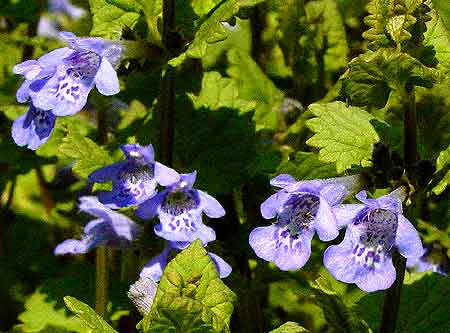From early days, Ground Ivy has been endowed with singular curative virtues, and is one of the most popular remedies for coughs and nervous headaches. It has even been extolled before all other vegetable medicines for the cure of consumption.

The plant also acquired the name of Gill from the French guiller (to ferment beer), but as Gill also meant 'a girl,' it came also to be called 'Hedgemaids.'
The infusion is also used with advantage as a wash for sore and weak eyes.
In America, painters used the Ground Ivy as a preventive of, and remedy for lead colic, a wineglassful of the freshly-made infusion being taken frequently.
Green (Universal Herbal, 1832) tells us that Ground Ivy expels the plants which grow near it, and in consequence impoverishes pastures. Cattle seem in general to avoid it, though Linnaeus says that sheep eat it; horses are not fond of it, and goats and swine refuse it. It is thought to be injurious to those horses that eat much of it, though the expressed juice, mixed with a little wine and applied morning and evening, has been said to destroy the white specks which frequently form on their eyes.
The whole plant possesses a balsamic odour and an aromatic, bitter taste, due to its particular volatile oil, contained in the glands on the under surface of the leaves. It was one of the principal plants used by the early Saxons to clarify their beers, before hops had been introduced, the leaves being steeped in the hot liquor. Hence the names it has also borne; Alehoof and Tunhoof. It not only improved the flavour and keeping qualities of the beer, but rendered it clearer. Until the reign of Henry VIII it was in general use for this purpose.
An excellent cooling beverage, known in the country as Gill Tea, is made from this plant, 1 OZ. of the herb being infused with a pint of boiling water, sweetened with honey, sugar or liquorice, and drunk when cool in wineglassful doses, three or four times a day. This used to be a favourite remedy with the poor for coughs of long standing, being much used in consumption. Ground Ivy was at one time one of the cries of London for making a tea to purify the blood. It is a wholesome drink and is still considered serviceable in pectoral complaints and in cases of weakness of the digestive organs, being stimulating and tonic, though it has long been discarded from the Materia Medica as an official plant, in favour of others of greater certainty of action. As a medicine useful in pulmonary complaints, where a tonic for the kidneys is required, it would appear to possess peculiar suitability, and is well adapted to all kidney complaints.
